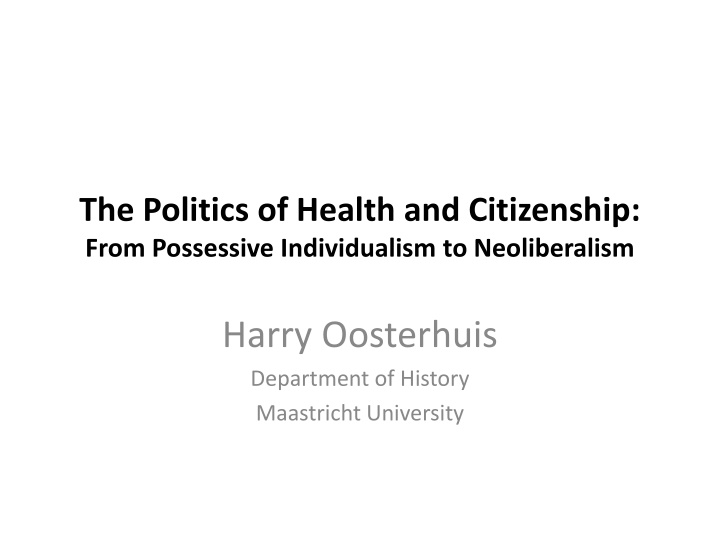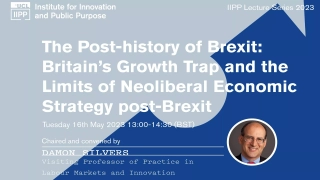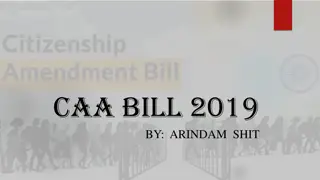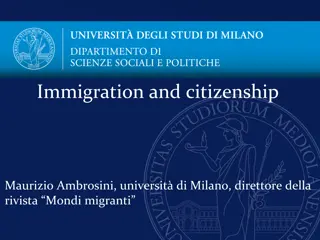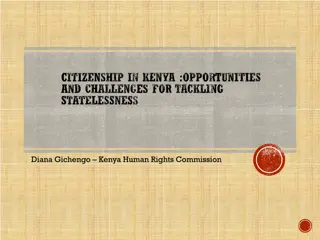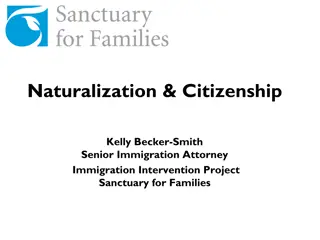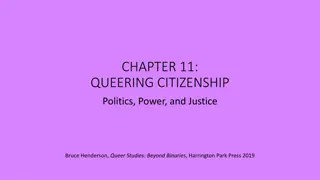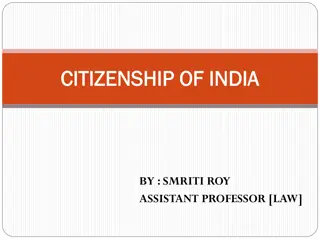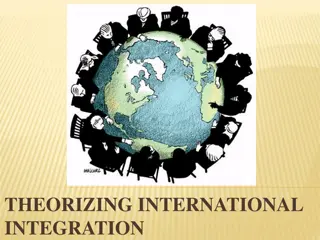The Politics of Health and Citizenship: Navigating Neoliberalism
Current debates in healthcare address escalating costs, shifting citizenship dynamics, and the balance between individual autonomy and civic obligations. The concept of citizenship is historically layered and contested, with implications for public commitment and inclusion/exclusion dynamics.
Download Presentation

Please find below an Image/Link to download the presentation.
The content on the website is provided AS IS for your information and personal use only. It may not be sold, licensed, or shared on other websites without obtaining consent from the author.If you encounter any issues during the download, it is possible that the publisher has removed the file from their server.
You are allowed to download the files provided on this website for personal or commercial use, subject to the condition that they are used lawfully. All files are the property of their respective owners.
The content on the website is provided AS IS for your information and personal use only. It may not be sold, licensed, or shared on other websites without obtaining consent from the author.
E N D
Presentation Transcript
The Politics of Health and Citizenship: From Possessive Individualism to Neoliberalism Harry Oosterhuis Department of History Maastricht University
Current issues and debates affecting health care Escalating costs: ageing populations, increasing numbers of longer surviving chronic patients, technically sophisticated and ever more expensive treatments. Rising expectations and demands, not only with regard to curing illness, but also to securing and improving or optimizing health. Can broad access to collectively funded health care as a basic civil right still be guaranteed? Global capitalism + neoliberal policies + collapse of communism + retreat of Social-Democracy The partial retreat of the welfare state and introduction of market mechanisms in health care. The concern about citizenship: civic virtues and obligations superseded by entitlements, passive dependence, and boundless claiming. The need to boost individual self-reliance and active participation as well as social adjustment and integration. Should citizens take more responsibility for their own health?
Citizenship: a historically layered and essentially contested concept What draws individuals together into a political community (nation), and what keeps that allegiance enduring and meaningful. Balance between public commitment and individual autonomy/self-direction. Defined and secured in the legal and political framework of the state and entangled in inclusion versus exclusion. Domain of citizenship overlapping with civil society and delineated from: the state itself the private sphere the market.
The expanding formal dimension of democratic citizenship Materialized during: 1870-1920 1789-1848 1945-1980 Legal political social citizenship civil rights legal equality in constitutional state political rights universal suffrage in parliamentary democracy social rights welfare benefits in welfare state
The sociocultural dimension Identification, belonging, involvement, competence, habitus, socialization: how people constitute themselves and act as involved and competent members of a community on the basis of identification and a sense of belonging; how they adopt and give actual meaning to rights, duties and contributions, and meet social, physical, mental and moral requirements for adequate functioning in society.
Health as human right [T]he enjoyment of the highest attainable standard of health is one of the fundamental rights of every human being without distinction of race, religion, political belief, economic or social condition. (Preamble to the Constitution of the World Health Organisation, 1945) Everyone has the right to a standard of living adequate for the health and well-being of himself and of his family, including [ ] medical care. (Article 25 of the Universal Declaration of Human Rights, proclaimed by the United Nations, 1948)
Health as civil right? Can health or the prevention of illness be considered as a civil right or as a human right? Easily stated in the abstract, but practical implementation fraught with difficulties. (Illness: nature and fate, inevitable biological distinctions). What do such rights exactly imply? Equal access to health care? No objective criteria for its range and quality, and the fair allocation of scarce resources. Which treatments of which patients should be covered by collective funds and on what conditions? What are the costs of saving and extending lives? How much of our income and tax-money can and do we want to spend on collectively funded health care?
Health as civic duty? To what extent are health and illness private or public issues? Should the state be accountable for the health of its citizens? How far should its interventions and enforcements go? Should it impose health standards and contributions on citizens for their own benefit and/or in the interest of the common good? How far does individual responsibility of citizens for their health go? Right of not to giving priority to their health, leading unhealthy lives? Who should pay for the consequences?
The twofold historical relation of health and citizenship Intact health, an able body and a sound mind, as a requirement for full citizenship. Citizenship as the prerequisite for the right to health, for access to the means for maintaining and restoring health. Shifting balance between rights and duties, inclusion and exclusion of either good and full citizens or troublesome, second-rate, impossible and non-citizens. A dynamic tension between on the one hand agency, self- determination, consent, voluntarism, liberation and empowerment and on the other regulation, control, coercion, repression, and disciplining.
Possessive individualism Hobbes (Leviathan, 1651) Locke (Two Treatises of Government, 1690) A materialist and empirical conceptualization of man as a being driven by natural feelings of pleasure and pain. Morality and the justification of sociopolitical order grounded in concrete physical and mental sensations. The axiom that life in itself is good and the taking of life is bad The essential need for physical security. The foundational claim of their social contract theory: as prime owners of their bodies individuals possess an inherent natural right to oppose pain and death and preserve their lives.
Locke: the person as a self-reflective, accountable and self-reliant agent Possession of one s body as natural right cultivated soil and material goods as rightful property individuals are the rightful owners of their thoughts, memories, feelings, acts, experiences, talents and capacities. The continuity of personal consciousness enabling the individual to experience himself as the same being in different places, social settings and times personal identity apart from social position and the moral destiny of one s soul recognizing all one s thoughts and actions over time as one s own, reflecting and judging on them personal accountability. Self-owning individuals should be free to decide for themselves what they do with what is naturally theirs without owing society anything. As far as they do not harm another in his life, health, liberty or possessions , the state should not interfere with their undertakings and self-development.
Stratified citizenship on the basis of naturalist criteria Citizenship as function of self-ownership and acquiring and managing property, which guarantee autonomy, self-reliance and freedom from dependence on others. The requirement of a capable body and sound mind as a precondition for citizenship: the capacity of a rationally organized life and superseding irrationality, to exercise will and control over one s own potentially disruptive drives and passions, and over others. Full citizenship defined on the basis of class and naturalist criteria (sex, ethnicity or race , age, mental coherence). Natural inequalities formal equality of opportunity.
Health as an essential ingredient of the bourgeois ethos The possession and management of a sound body and mind crucial for the self-definition of the rising bourgeoisie and its self-affirmation against the frivolous and squandering aristocracy and the irrational, irresponsible, incapable and unwilling lower classes. Meaning of health entwined with core middle-class merits: independence and self-reliance, self-control and responsibility, soberness and moderation, cleanliness and moral purity, regularity and order, willpower and foresight, utility and achievement, and thrift and investment. Evaluating more and more aspects of life in terms of health and expansion of the medical domain. Health and illness as an object of modern politics.
Health and illness as an emergent object for state-intervention Plague epidemics and the burden of the chronically diseased without means quarantine, surveillance, charity. Late 18th and early 19th century: enlightened optimism about the progress of science and technology health and illness conceptualized as a public issue and target of state policy. The emergent role of the state in the pursuit of a rational and efficient organization of society preventing contagious diseases and promoting hygiene by medical police under enlightened despotic regimes.
Health and illness as an emergent object for democratic politics Significant reference points for linking health and democratic citizenship, eventually realized in the 19th and 20th centuries: 1770s-1848: democratic revolutions transforming passive subjects under traditional rulers into citizens with rights and duties inclusionary and equalizing vision of health and illness. French Revolution: public programs for health care and disease prevention proposed, implying rights and obligations for citizens. Thomas Jefferson and Thomas Paine: realization of civil liberties requires good health, which can be advanced through constitutional and democratic government. Jeremy Bentham s utilitarian argument: politics of health implying social reform with the help of state-intervention indispensable for socioeconomic efficiency and progress and for advancing equality of opportunity.
Sanitary reform and public hygiene Disruptive effects of industrialization and urbanization on the health of the working class and poor combatting endemic and contagious diseases, and improving environmental conditions of health: urban cleansing, infra- structural and sanitary provisions. Civilizing project in order to elevate and integrate the lower orders (making self-responsible citizens out of them) and protect the middle classes. The dilemma of individual freedom and the common good/state-intervention
Professional and technocratic public health regimes ( governmentality ) Mid-19thcentury: public hygiene geared toward environmental approach and social reform. Late 19th/early 20thcentury: professional medical regime on the basis of scientific knowledge and technocratic expertise, implying biological reductionism (bacteriology, degeneration theory, Social-Darwinism, racial hygiene, eugenics, social- hygienic aspirations of psychiatry and criminal anthropology) stretching definitions of pathology and mental disorder/abnormality.
Undemocratic and totalitarian health policies Growing bourgeois anxieties about the leveling effects of mass-democracy, socialism and feminism emphasizing innate inequalities between bloodlines, sexes, classes, normal and abnormal, healthy and ill physical and mental capacity as selective standard for sociopolitical inclusion and exclusion. Coercive health policies focusing on the quality of the population en masse for the sake of national/ racial vitality and survival the involvement of medical professionalism in biomedical regimes violating the liberal-democratic threshold of individual rights and liberties. Liberal possessive individualism exclusionary possessive tatisme ( biocracy ) through enforced eugenics and racial hygiene.
The socialization of health care: democratic nexus health and citizenship Medicalization as a pacifying and inclusionary extension of rights in the framework of social citizenship. Coercion and tutelage public health interventions relying on agreement and co-operation: education, advice, counselling, social support and material assistance in order to motivate and encourage citizen s self- direction and self-advancement, and to instill habits and attitudes conductive to cleanliness, hygiene, healthy lifestyles, and self- development making up productive and adaptive as well as self- conscious and self-responsible citizens. Universal suffrage, emancipation of the working class, and sacrifices in two world wars state assuming responsibility for the accessibility of health care on the basis of social insurance schemes and state guaranteed entitlements: equal access to basic health care as civil right.
The pitfalls of socialized health care: rising expectations, growing demands, escalating costs Aging populations, more surviving chronic patients, the very success of curative medicine, the advance of ever more sophisticated and expensive treatment options and biomedical technologies, and the growing supply of alternative cures. Inherent dynamics of welfare regimes: depoliticizing potentially controversial social issues by redefining them as medical and psychological ones and referring them to the subsidized domain of the helping professions. fostering in citizens a sense of rights and entitlements and thus triggering rising expectations, growing demands and mounting tensions over the range and priorities of provisions. Meaning of health expanding through the growing impact of preventive and predictive medicine, healthism and life politics health as the crucial benchmark for the quality of life endless expectations and claims whereas the means are finite worries and controversies about the endurance and organization of health care systems entailing a redefinition of the health and citizenship nexus.
The new public health Broadened and intensified public and political concern about health Predictive and preventive approach focusing on the detection and epidemiological mapping of health risks and the prognosis of possible illnesses among the general population. Individualization of responsibility for health suggestion that health and illness can be within the control of reflexive and competent individuals who are motivated to boost the physical and mental quality of their lives. Individual autonomy and self-determination stressing patient s rights and integrity, free choice and informed consent a more active stance of patients and health consumers.
The comeback of possessive individualism The dovetailing of the built-in requirements of health policies and life politics (a self-responsible, self-monitoring, self-empowering and choice- making attitude) and the neoliberal framing of citizenship based on a self- interested and de-socialized individualism Possessive individualism as general standard: the suggestion that self-sufficient and motivated individuals have by definition free choice and can optimally shape their lives and realize self-fulfillment through an enterprising and calculating manner, exploiting their inner resourcefulness, proper self-management and self-promotion. Citizens should act according their own best will and get the best out of themselves The requirement of particular psychological and social abilities: continuous self-examination, emotional self-control, self- evaluation, and decisiveness, but also flexibility and an agreeable, communicative and cooperative attitude.
The neoliberal complications of health and citizenship The socialization of responsibilities in the field of health and illness: balance between individual and collective self-determination. The neoliberal upsetting of this balance through the revival of naked possessive individualism, again enabling inequalities and exclusions.
Are autonomy and self-determination adequate guidelines in the practical reality of illness? Illness as the very experience that makes us painfully aware that we are our bloody body, that our ability to own and control it is limited, and that in the end it owns and controls us. Illness, implying suffering, pain, dependency, anxiety and confusion, basically involves a partial or complete lack or loss of the essential capacities of possessive individualism.
Are autonomy and self-determination adequate guidelines in the reality of health care? The patient as a freely choosing consumer? Do patients always have the proper information at their disposal to be able to choose, and do they always want to have a choice? The provisions of collectively funded health care are still largely monopolistic, standardized and subject to the economic imperative of cost- efficiency. The growing sophistication of medical expertise and technology complicates lay assessment of health care practices.
Is the biomedical vision of the good life a threat to democratic values? Is the ideal of autonomy and self-determination achievable in all circumstances and for everyone? Uncertainty about what constitutes a risk, its implications, and how to deal with it. Undermining of public trust which citizens may or may not have in biomedical science and expertise. Ill health still being determined by different individual constitutions and socioeconomic and cultural factors. Preventive and enhancement approach forcing up health standards increase of inequalities and exclusions: second-rate citizens? Maximizing health and minimizing illness as a civic obligation those who lack the ability and will to health: risky/failed citizens?
Conclusion: The entwinement of the development of modern health regimes and the rise and expansion of citizenship Their relation was one of mutual facilitation as well as of tension, involving a dynamics of inclusion versus exclusion, equality versus inequality, liberation versus suppression and rights versus duties. The expansion and socialization of health care and the expansion of the medical domain in the past two centuries should not only be interpreted as an inevitable and coherent medicalization, or imposition of biopower . The sociopolitical implications of health and illness and health care were entangled in various interactions and tensions between the state, medical professionals and either more active or more passive citizens.
